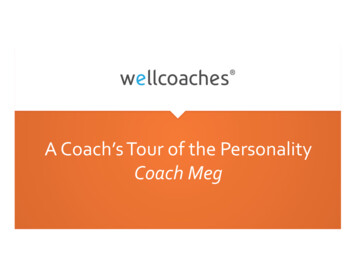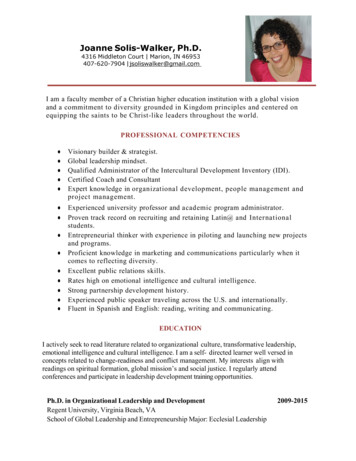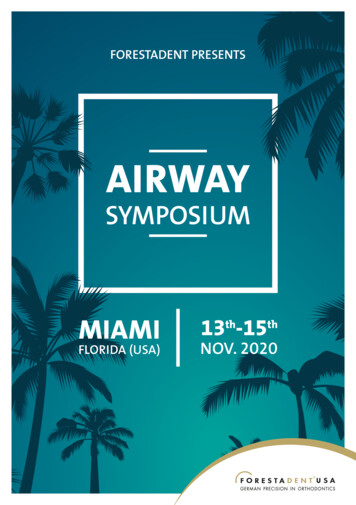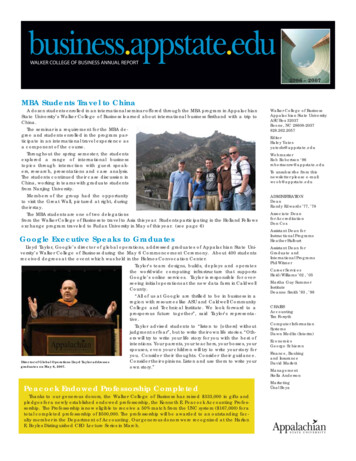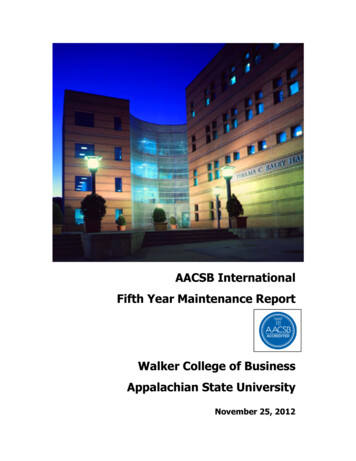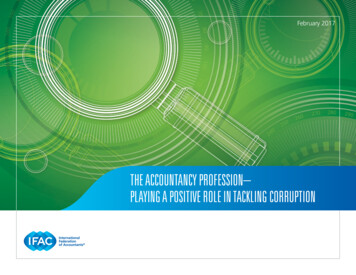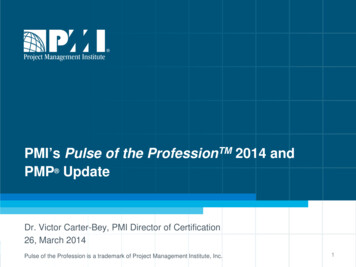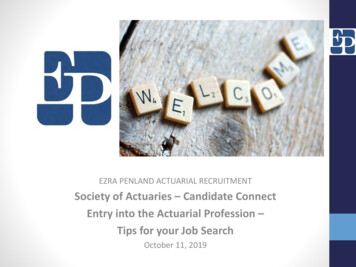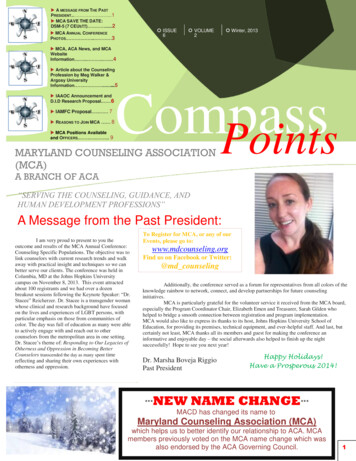
Transcription
A MESSAGE FROM THE PASTPRESIDENT. . .1 MCA SAVE THE DATE:DSM-5 (7 CEUS!!!) .2ISSUE6 MCA ANNUAL CONFERENCE HOTOS . 3P MCA, ACA News, and MCAWebsiteInformation. . . .4VOLUME2Winter, 2013 Article about the CounselingProfession by Meg Walker &Argosy UniversityInformation . .5 IAAOC Announcement andD.I.D Research Proposal. 6 IAMFC Proposal. . 7 REASONS TO JOIN MCA 8 MCA Positions Availableand OFFICERS. . . . 9CompassPointsMARYLAND COUNSELING ASSOCIATION(MCA)A BRANCH OF ACA“SERVING THE COUNSELING, GUIDANCE, ANDHUMAN DEVELOPMENT PROFESSIONS”A Message from the Past President:I am very proud to present to you theoutcome and results of the MCA Annual Conference:Counseling Specific Populations. The objective was tolink counselors with current research trends and walkaway with practical insight and techniques so we canbetter serve our clients. The conference was held inColumbia, MD at the Johns Hopkins Universitycampus on November 8, 2013. This event attractedabout 100 registrants and we had over a dozenbreakout sessions following the Keynote Speaker: “Dr.Stacee” Reicherzer. Dr. Stacee is a transgender womanwhose clinical and research background have focusedon the lives and experiences of LGBT persons, withparticular emphasis on those from communities ofcolor. The day was full of education as many were ableto actively engage with and reach out to othercounselors from the metropolitan area in one setting.Dr. Stacee’s theme of: Responding to Our Legacies ofOtherness and Oppression in Becoming BetterCounselors transcended the day as many spent timereflecting and sharing their own experiences withotherness and oppression.To Register for MCA, or any of ourEvents, please go to:www.mdcounseling.orgFind us on Facebook or Twitter:@md counselingAdditionally, the conference served as a forum for representatives from all colors of theknowledge rainbow to network, connect, and develop partnerships for future counselinginitiatives.MCA is particularly grateful for the volunteer service it received from the MCA board,especially the Program Coordinator Chair, Elizabeth Emen and Treasurer, Sarah Gilden whohelped to bridge a smooth connection between registration and program implementation.MCA would also like to express its thanks to its host, Johns Hopkins University School ofEducation, for providing its premises, technical equipment, and ever-helpful staff. And last, butcertainly not least, MCA thanks all its members and guest for making the conference aninformative and enjoyable day – the social afterwards also helped to finish up the nightsuccessfully! Hope to see you next year!Dr. Marsha Boveja RiggioPast President***Happy Holidays!Have a Prosperous 2014!NEW NAME CHANGE***MACD has changed its name toMaryland Counseling Association (MCA)which helps us to better identify our relationship to ACA. MCAmembers previously voted on the MCA name change which wasalso endorsed by the ACA Governing Council.1
2
MCA Annual Conference 2013At Johns Hopkins University3
MCA NEWSBuild a Bridge to GraduateInstitutionsThe Maryland Counseling Association (MCA) is excited to share ournew initiative: “Build a Bridge to Graduate Institutions.” The initiativeaims to build a strong relationship between local universities and MCA thatfosters the support and development of graduate students and newprofessionals.MCA wants to support faculty and students by: (1) informing studentsof our national parent organization the American Counseling Association(ACA) and counselors roles nationally and locally; (2) providing guidancethrough MCA such as networking, socializing, and mentorship; (3)providing a place for students to create and share ideas as well as fostertheir skills with the support of other colleagues; and (4) being a part of anorganization which appreciates their efforts as counselors whileunderstanding their individuality.At this time, MCA members are meeting faculty and students at theirinstitutions: Johns Hopkins, Argosy, Loyola and Bowie. MCA recognizesby attending graduate meetings/events and discussing the benefits ofMCA/ACA can encourage new professionals to get involved, stay involvedand grow in the field of counseling.MCA strongly believes it can be an additional support system for facultyand students, with this recurring opportunity to connect and support ourstudents to grow in the field of counseling.Sincerely,Rufus Tony Spann, MCA President ElectWRITE THIS DOWN: February 1, 2014—DSM-5 Marriage/Family Conference 9:00 – 5:00(John Hopkins University—Rockville) March 8, 2014—MCA Social (Gaithersburg) March 28, 2014—Maryland School Counseling Conference (Greenbelt) April 24, 2014 – April 25, 2014—MCDA Conference (Columbia) November 14, 2014—MCA Annual Conference (Columbia)ACA NEWS:What:The American Counseling Association (ACA) is hosting its2014 Annual Conference & ExpositionWhere:Honolulu, HawaiiWhen:March 27-30, 2014**MCA’s New Website**If you have visited our website,MDCounseling.org, this month, you know thatit has a new look. Behind the scenes is a differentOnline Membership Management System. Pleasecheck out the new website.What does an Online Membership Management System provide?1. It includes a database of contact names, membership status,past events attended, fees paid, etc. We transferred all of thecurrent data, and downloaded the historical data, so that wecan look up the information if questions arise. Yourinformation should now be in the new system.2. It collects payments for events. We are in the process ofsetting up a new credit card processing system. In themeantime, we are using PayPal.3. It sends reminders when your memberships expires andassures that members are charged member rates for events.It also delivers newsletters and announcements to you. Ifyou do not wish to receive our announcements, you canUnsubscribe and we will take your name off of our contactlist.4. It hosts our webpages, photos, documents, etc., which canbe accessed by any authorized person anywhere in theworld that has an Internet connection (even when we are onvacation).Why did we do this?1. The primary reason for the change was to make life simplerfor the Board. We need a system that is easy to use, sinceour Board members are all volunteers, change often, and wecannot expect them to learn a complex system. We believethat the new system is much more intuitive and will,therefore, be easier to maintain.2. The new system costs less and we pay a fixed fee permonth. Previously, we also paid a small amount for eachtransaction, but small amounts add up.What does the new system mean to you?1. The information that did not transfer includes yourpassword and your photo. Please visit the new website andlog in. There is a small logon box in the upper right. Enterthe same email address that you previously used. Thenclick Reset Password. If you have any problems, send anemail to Website@MDCounseling.org. When you viewyour profile, you will immediately see that it looksdifferent. Please upload a small picture of yourself (justyour face) so that acquaintances from past events can findyou. As counselors, we love to see smiling faces, andadding yours to your profile really helps us to feelconnected.2. All of the association emails changed. To reach us, visit theContact US page.3. Some information may have been lost during the transition.Our previous provider shut off our access prematurely andwe were not able to access transactions that occurred in thefinal week of May or the first week of June. If yourinformation did not transfer correctly, send an email toWebsite@MDCounseling.org.4. Remember to log on whenever you visit our website (or“Stay logged on”) so that you can see the special featuresfor members, including the Membership Directory.We hope that you enjoy our new website. Please let usknow if there are features that you would like us to add.Please Contact Jose Medrano, MCA’s webmaster if you are interested involunteering!4
Professionally Speaking: Are You Where You Want to Be?Meg WalkerJohns Hopkins University, Class of 2014With the New Year’s holiday right around the corner many have begun to reflect of their past success, achievements, newly developed needs, and future goals. Have you considered New Year’s resolutions for yourcareer? If not, no problem! Here are 8 professional New Year’s resolutions that you can add to your list so you can maximize your professional impact and advocate for the counseling profession in 2014.1) Know Thy Professional SelfKnow who you are professionally and what you are bringing to the table. Take time to really look at yourself and consider your specific skill sets and training. As counselors, we have to be very clear about who weare and what we have been trained to do, so that our professional identity will not be dictated or formed by our workplace. If we don’t advocate for ourselves, someone else who may be less educated in our uniquetraining standards may be more than happy to fill in the gaps. A strong professional identity is crucial to the self-esteem and attitude of each counselor and will send the message that you are competent and willreinforce the importance of your services.2) Speak Up and Take Pride!It has been my experience that the public doesn't understand the distinction in mental health professions. It is important that we present ourselves to the public and to clients as a professional counselor; not as atherapist, psychologist, or social worker. Counselors must advocate for their profession by making sure that the public understands the profession of counseling, how it differs from other helping professions, and howit can benefit them in ways that are different from psychology and social work. We are first and foremost professional counselors, specialties can be explained later.3) Appreciate and Honor What Has Been Done Before UsThe profession of counseling has come a long way in the past few years. Counselor licensure in all 50 states is certainly one of the most notable accomplishments. As counselors, we must acknowledge all the hardwork performed by many individuals to make the stronghold of our profession a reality. It is our duty to maintain our presence, and distinct identity among the helping professions. We can do so by joining andparticipating as an active member of professional counseling associations, making licensure a priority, and by assuming the responsibly to promote the identity of professional counselors.4) Mentor, Network, and CollaborateExpand your professional network and make yourself available to other professionals. Helping new counselors form their identities will help you take pride in your own identity. In addition, social activism effortshave more power if we are united as a group, versus collections of fragmented groups. You can advocate by contributing your skills and experiences to your state organization. Networking can provide power to yourvoice, and this is typically where change begins!5) Know What You Don’t KnowStudents and seasoned professional advocates alike need to understand what they do not know, and make sure that they educate themselves as professional counselors by talking with those who have more experienceto mentor them along the way. Continuous learning and development is a hallmark of the counseling profession. It is our ethical responsibility to further our education, learn new skills, and increase our knowledge ofnew technologies.6) Self CareSelf care is a crucial aspect to maintaining professional effectiveness and preventing burnout. Remember, we are also human. Take time to reflect on your reasons for pursuing professional counseling, organize andre-evaluate your professional objectives, and look at where your time is being invested.7)Determine How You Quantify Accomplishments or SuccessesIt is generally unwise to leave accountability and evaluation entirely in the hands of those who do not understand a counselor’s role in treatment and do not have the expertise to determine when or how the counselor’sgoals are accomplished. It is important not only the profession itself, but to the individual to provide some process of quantification and indication of successful results, however, they may be determined. Sociallyvalid research is a form of intentional advocacy, and its time to firm up scientific foundations of our practices.8) Unity and Future IdentityAsk yourself to step back and look at the big picture of the counseling profession. As a whole, many may agree that we have taken many strides but that we are still in the process of refining our professional identity.How are you contributing to this? What do you see as the future of the counseling profession? I urge professionals to look nationally as well as globally, and to deduce what can be done at a local level. No doubt theoncoming aging population, increasingly diverse communities, technology, integrative medicine, changes in managed care, and the growing social awareness of mental health will have an impact on our practices. Asmembers of the professional counseling community it is our responsibility to be our own agents of change. We alone must decide how to incorporate all the new and growing aspects of the counseling profession whilerespecting our uniqueness and representing our clientele. No one is better equipped to determine the direction, identity, and practices of the counseling profession than its members. Ultimately, who we are and wherewe are professionally must be determined by how counselors educate others, rather than having others determine who they think we are.5
International Association of Addictions andOffender Counselors (IAAOC)Hello, my name is Keith Morgen and I am the 2013-14 President of the International Association ofAddictions and Offender Counselors (IAAOC), a division of the American Counseling Association. As part ofmy Presidency I am trying to increase the communication between our division and the various state counselingassociation chapters.If YOU have expertise, experiences, and practice in the addictions and/or prison populations, feel free tocontact me when you can. Thank you.Keith Morgen, Ph.D., LPC, NCC, ACSIAAOC President 2013-14Assistant Professor of Counseling & PsychologyEditor, Annual Review of Best Practices in Addictions and Offender CounselingPresident, International Association of Addictions and Offender Counselors - A Division of the American Counseling AssociationCentenary College400 Jefferson Street, Box 473Hackettstown, NJ 07840908-852-1400, x2419morgenk@centenarycollege.eduInterested in Research?The Treatment of Patients with Dissociative Disorders (TOP DD) study is an internationalprospective treatment study that found that patients with severe dissociative disorders showeddecreases in dissociation, PTSD symptoms, self-harm, suicide attempts, and hospitalizationswhile also improving functioning during 30 months of treatment. So far the study has had eightpapers accepted for publication. The next TOP DD study will build upon the findings andmethodology from the first study. Bethany Brand, Ph.D. of Towson University and hercollaborators documented that suicide attempts and self-injurious behavior were associatedwith therapists infrequently using emotion regulation interventions, among other challenges.The researchers have developed a web-based educational program that teaches dissociativepatients to regulate emotion, manage dissociation, and cope with unsafe urges. To be eligibleto participate, both patients and their therapists must enroll in the study. Patients need tocommit to doing 1-2 hours of work per week including: watching educational videos,completing writing exercises, and practicing daily skill-based exercises.Towson University has created a story about the TOP DD study featuring the stories of twoformer students at http://www.towson.edu/ (click on the first circle below the story caption if apainting of a woman's face shifting states is not currently showing).The TOP DD team is recruiting new participants for this study. You can learn more about it athttp://topddstudy.com or sign up by emailing the researchers at TOPDD@towson.edu6
Dr. Loretta BradleyPresidentTexas Tech UniversityLoretta.Bradley@ttu.eduDr. Robert SmithExecutive DirectorTexas A&M UniversityCorpus ChristiRobert.smith@tamucc.eduDr. Stephen SouthernPast-PresidentMississippi Collegesouthern@mc.eduDr. Brandé FlamezGoverning Council RepWalden Universitybrande.flamez@waldenu.eduNicole NobleSecretaryTexas Tech UniversityNicole.Greak@ttu.eduDr. Bret HendricksTreasurerTexas Tech UniversityBret.Hendricks@ttu.eduDr. Brian S. CanfieldBoard Member At-LargeFamily CounselingAssociates of LouisianaDrBSC@aol.comAbby PlattGraduate Student NewProfessionalWalden Universityabby.platt@waldenu.eduStefani SchomakerMembership CommitteeChairsaschomaker@gmail.comStevie PuckettWeb Consultantsteviepuckett@gmail.comDr. Brian S. CanfieldInternational DirectorFamily CounselingAssociates of LouisianaDrBSC@aol.comDr. Doris CoyChair, Special MediaProjectsdoriscoyphd@gmail.comRoseanne OppmannChair, IAMFC Branchescounselro1@gmail.comDr. Janet FroeschleChair, Special Eventsjanet.froeshle@ttu.eduInternational Association of Marriage & FamilyCounselorsJoinIAMFCJoin online: IAMFConline.orgProfessional Members 60Student Members 44Benefits of Membership Subscription to The Family Journal Subscription to The Family Digest (electronicnewsletter) Access to the Code of Ethics for Couple &Family Practitioners Networking with other counselingprofessionals Family Therapy Certification throughIAMFC's affiliation with NCA Professional advocacy Public policy initiatives Opportunities for leadership and mentoring Access to liability insurance through CPH &Associates Discount rate for CEU opportunities Online interactive access: iamfconline.orgInternational Association of Marriage and Family Counselorswww.iamfconline.org7
Want to Join MCA?Here’s Your Chance!Apply ONLINE or by MAIL:http://www.mdcounseling.org/Why Should You Join MCA?Membership is important to your professional growthand career development. It provides: Continuing education units at discountpricesEarly notification of MCA and alldivision eventsCurrent Public policy issues and newlaws of interest to professionalcounselorsGrant opportunitiesFour newsletters and opportunities toadvertise your business throughcontributing articlesEarly notification of job openings inthe field of counselingLeadership training and greatlyreduced registration costs to annualregional or national conferences forboard membersFree registration to allMCA conferences and workshops forboard membersElectronic reminders to renew yourmembershipA list of events that you haveparticipated in (and soon to come amethod of keeping track of CEU's youearned).Support and advocacy for professionalcounseling in the state of MarylandClick here to join MCA today!Not ready to join? Choose the non-Member Contact option for a no-cost way to add your name to our email list.8
MCA BoardPositions AvailableMCA OFFICERS:PresidentCharles M. Guthriecharles.guthrie3@gmail.com Newsletter AssistantCEU AssistantWebsite AssistantAssistant SecretaryPresident ElectR. Tony Spannrufusspann@yahoo.comSecretaryEmily KirchnerKirchner.emily@hotmail.comTreasurerSarah Gildensgilden@gmail.comPast PresidentMarsha B. Riggiomarshariggio@yahoo.comContact Marsha Riggio,MCA Past President formore information.DIVISION PRESIDENTS:MACES PresidentCassandra Clarke-Williamscclarkewilliams@gmail.comMSCA PresidentLaura OwenMAMCD PresidentRaymond ShorterRshorter00@yahoo.comMCDA PresidentBerri VIC PresidentMAMHC PresidentDominic Ciercedlcieri@aol.comElizabeth Nyangelizabethnyang@hotmail.comMAMFC PresidentMarsha Riggomarshariggio@yahoo.comCOMMITTEE CHAIRS:Newsletter ChairBradley J. Spoonbspoon28@gmail.comTony Spann, Charles Guthrie and Marsha B. Riggio (MCAPresident-Elect, President
Argosy University Information . Additionally, the conference served as a forum for representatives from all colors of the knowledge rainbow to network, connect, and develop partnerships for future counseling initiatives. MCA is particularly grateful


